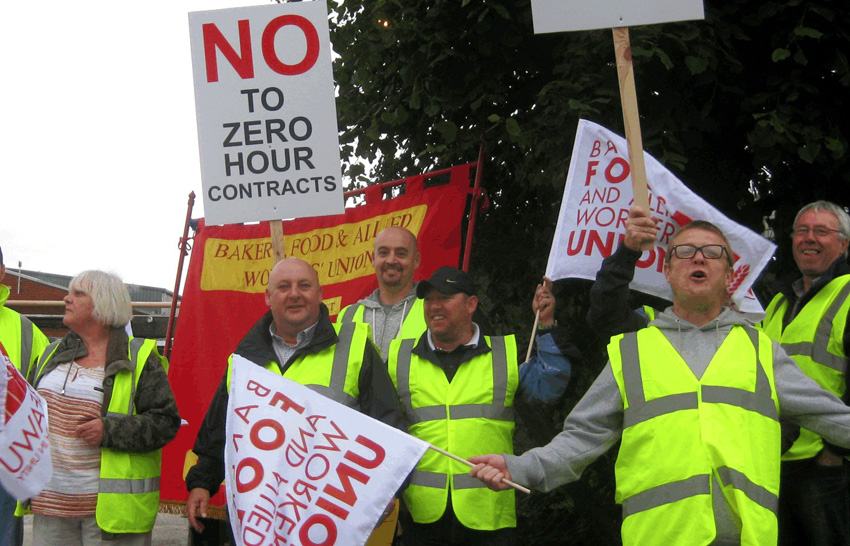YESTERDAY lunchtime TUC general secretary Paul Nowak gave a press conference ahead of the Congress.
The main thing he talked about was the upcoming Employment Rights Bill which includes the banning of zero hour contracts.
Nowak stated: ‘I am confident that the government will put through the Employment Rights Bill. I have seen no evidence that it will be watered down.
‘I am confident because of the amount of working people in this country that support it. It is enormously popular with voters. I have said that we are against cuts to welfare and benefits. I would be against any watering down of the Bill.
‘We always want more for our members. We fight to make sure that cuts do not fall on the poorest in society. The ones with the broadest shoulders who are most able to pay must play their part.
‘The way to defeat the far right and the populist right is to fight to improve the lot of the lowest-paid workers, that is what we will continue to do.’
The union Unite described the Labour government’s commitment to ban the practice of fire and rehire of workers as now nothing more than a ‘burned out shell’.
Unite has already been highly critical of Labour’s decision to allow private sector employers to continue to use fire and rehire if a company faces financial issues, and cuts to pay and conditions would reduce those financial difficulties.
In July of this year, the government made fresh amendments to its Employment Rights Bill and further weakened the ban on fire and rehire. Under the new provisions, local government and public sector employers can fire and rehire workers.
Unite general secretary Sharon Graham said: ‘Labour’s promise to ban fire and rehire is now a burned out shell. Amending the Employment Relations Bill to allow councils to use fire and rehire has given them the green light to push down workers’ pay to cut debt. Yet again, workers pay the price.
‘This, along with the government’s reshuffle taking out all ministers who have worked with unions on the Bill, signals a move in the wrong direction. Workers will feel duped when they realise the Bill is a paper tiger.
‘Unscrupulous employers will continue to exploit workers and the Bill will do little to combat that.’
Unite points out that under the revised Bill, in local government, if a council has issued a section 114 notice and government has appointed commissioners, then fire and rehire will be allowable.
In the NHS and the rest of the public sector if an accounting officer claims the body is struggling to meet its duties, then fire and rehire becomes legal.
Birmingham Council is currently threatening to fire and rehire its refuse workers after they refused to accept pay cuts of £8,000 (between a quarter and a fifth of their incomes).
‘4 MILLION PEOPLE IN 2024 WERE IN INSECURE WORK!’
– TUC Congress special survey shows
ON THE first day of the TUC Congress in Brighton yesterday, the TUC published the results of its survey on the scale of insecure work in the UK.
TUC analysis of labour market data shows that four million people in 2024 were in insecure work. This amounts to around one-in-eight of the workforce.
In 2011, 3.2 million people were in insecure work. By 2024, this was four million.
This means that over 14 years of Conservative-led governments the net increase in insecure employment was around 800,000.
Between 2011 and 2024, the proportion of those in insecure work also grew, from 10.7% of the workforce to 11.7%.
Insecure work has an enormous effect on people. The prospect of having work offered or cancelled at short notice makes it hard to budget household bills, plan wider life, and meet caring responsibilities.
Insecure work is also low paid in comparison to permanent employment leaving many insecure workers struggling financially. Insecurity and low pay go hand-in-hand.
When estimating the number of people in insecure work the TUC includes: those on zero-hours contracts; agency, casual and seasonal workers (but not those on fixed-term contracts); and low paid self-employed workers (defined as those who earn less than two thirds of the median wage, which equates to £11.24 per hour).
Overall, men are more likely to be in insecure work; 12.4% compared to 11.1% of women.
Insecure work disproportionately affects groups of workers who are already discriminated against in the workplace. TUC research shows that in 2024 16.3% of Black and Minority Ethnic (BME) workers are likely to be in insecure work. This compares to 10.8% of white workers.
Since 2011, the number of BME workers in insecure work increased by over two-and-a-half times from 360,000 to 935,000.
The increase in insecure work for BME workers has been apparent amongst both men and women, though the percentage point increase is larger for BME men, at 5.5 percentage points. During the same period, there has been a small fall in white men in insecure work.
